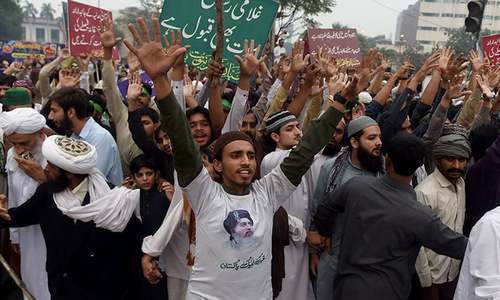The Supreme Court on Saturday ordered the federal and provincial governments to compensate within one month the affectees of violent protests held in the wake of the release of Aasia Bibi — a Christian woman previously condemned to death on blasphemy charges.
A two-member bench, under Chief Justice of Pakistan Mian Saqib Nisar's stewardship, was hearing a suo motu case at the Lahore registry.
Read: These 7 points explain the Supreme Court's decision to free Aasia Bibi
Punjab advocate general, at the outset of the hearing, told the court that losses have been estimated to the tune of Rs262 million, adding that the cabinet has approved the estimated figure.
"You have submitted reports [on estimated loss] but what about the time frame and the mode of payments," the chief justice asked.
"Have you devised a plan or is this [merely] paperwork?" Justice Aijazul Ahsan enquired.
At this, the interior department's section officer assured the bench that payments will be made during the ongoing month.
The court ordered the provincial government to submit an implementation report after making payments within a month.
During the last hearing of the suo motu notice on loss of properties during violent protest against the release of Aasia Bibi, the apex court had directed the federal and provincial governments to submit their plans for the payment of compensation to those who lost their lives and properties during protests.
Justice Nisar had expressed dissatisfaction over reports submitted by the governments of Punjab, Sindh and Khyber Pakhtunkhwa about the loss of lives and damage caused to private property by the protesters.
A Punjab law officer had told the bench that as many as 2,936 activists and their leaders had been detained. He said 503 cases were registered, including 26 under terrorism charges. He had added that the damage caused to public property had been estimated at Rs40.6 million.
The law officer said the damage to private property was estimated at Rs3.3m in the province.
The government should have invited the claims through newspaper advertisement, Justice Ijazul Ahsan had observed and said the report was not satisfactory, rather a faulty one.
An additional home secretary had told the bench that the matter of mode of compensation amount would soon be taken up by the provincial cabinet.
The Sindh IGP had told the bench that 342 protesters were arrested in 41 cases registered by the police. The report filed by the KP government showed that 62 people were arrested. It said the protesters had not caused any major damage to public and private property in the province. An officer from Islamabad said no incident of ransacking or damage was reported in the federal capital.














































